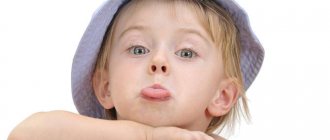The topic of a child’s adaptation to kindergarten does not lose its relevance. Many parents are faced with difficulties in getting their son or daughter accustomed to new conditions and do not know how to properly resolve them.
In this article, we will tell moms and dads what a child’s adaptation to a preschool institution involves, what degrees and stages of adaptation exist, and how to help the child adapt to the children’s group as quickly as possible.
Make sure that your child's adaptation is going smoothly or check if he has any problems so that you can help in time. Use the “Where are my children” application in combination with a children's smart watch - instantly contact your child, listen to the sound around you and always know where he is.
What is the adaptation of children to the conditions of a preschool educational institution?
A preschool educational institution is called a preschool educational institution. Many people assume that we are talking exclusively about kindergarten. This is wrong. Preschool educational institutions also include any child development centers. Adaptation of young children to the conditions of a preschool educational institution is not an easy process. For example, even the entry of children into a nursery radically changes the lifestyle of the entire family. The baby and parents are worried. The family is accustomed to the fact that the child is always under control and it is difficult for them to adapt to anything else. The preschooler experiences stress, trying to adapt to a different daily routine and sleep schedule. Obvious changes occur: the baby does not see loved ones for several hours, eats slightly different food, and so on.
Subsequent development and successful stay in a preschool institution depend on his ability to adapt to changes. By adapting young children to the conditions of preschool educational institutions, emerging problems are eliminated and children’s adaptability to novelty is formed.
An important aspect is the social adaptation of children. The child should test himself in an environment to get used to the preschool educational institution, taking into account his age.
Phases of the adaptation process: acute, subacute, compensation
There are several phases of adaptation of young children to the conditions of a preschool educational institution.
Acute phase
Characterized by various fluctuations in mental status and somatic state. Consequences are observed in the form of periodic respiratory diseases, sleep disturbances, loss of weight and appetite, and regression in speech development. Symptoms last for about a month.
Subacute phase
The child's behavior is quite adequate. All negative manifestations are reduced, appearing only in certain parameters. This occurs against the background of a low rate of development (especially mental) in comparison with average age norms. Symptoms may last 3-5 months.
Compensation phase
The phase is characterized by an increased rate of development, thanks to which the child overcomes the previously mentioned developmental delay by the end of the school year.
Problems related to adaptation remain in the theoretical plane, limited to short recommendations for parents before the child enters kindergarten - to bring the home daily routine closer to the routine of a kindergarten or other institution.
At the same time, the adaptation period is very important: it requires radical actions by adults. The solution to the issue lies with preschool teachers. They have to organize the baby’s life so that he can painlessly and adequately adapt to new conditions.
Useful skills for a kindergartener
How to make it easier for a child to adapt to kindergarten? One of the most important points is independence in as many areas of his life as possible. The more the baby can do, the easier it will be in the garden for both him and the teachers.
- Dress and undress independently, at least partially. If a child is taught to do this with minimal help, then he will not have to sit and wait until he is changed, no one will scold him for lack of independence, he will learn to take responsibility for his things.
- Eat on your own. The child must master the ability to hold a spoon and bring food to his mouth before he goes to kindergarten. Otherwise, he risks remaining hungry throughout the day or he will have to wait until his turn comes and he is fed.
- Refusal of diapers. It’s good if, before entering kindergarten, the baby can use some word to inform adults about his need to go to the toilet. In this case, he will have a minimum of wet pants in his locker when his parents arrive.
- Interact with children and adults. Don’t be afraid of anyone, don’t offend anyone, be able to negotiate on a simple level. Communication in kindergarten is inevitable, and in the absence of skills, serious problems with communication and adaptation arise.
- There are different foods. It is difficult for those children who are accustomed to eating only pureed food or semi-finished products to get used to kindergarten food.
Degrees of adaptation to preschool educational institutions
Let us consider the degree of adaptation of young children to the conditions of a preschool educational institution.
Lightweight
It is typical for a group of children who attend the institution without any special worries, with desire. The adaptation period is usually limited to 3-4 weeks. Such a baby practically does not cause any trouble. The changes in behavior that occur are short-term and almost imperceptible.
Characteristic behavior:
- The baby enters the group without excitement and looks around with curiosity.
- When an unfamiliar adult addresses him, the child looks into his eyes. Can initiate contact himself and ask for help.
- Able to keep himself occupied, mood cheerful or calm, emotions easily recognizable.
- The child adheres to the designated norms of behavior, demonstrates an adequate reaction to approval or comments, and adjusts behavior according to the situation.
- He is kind to children and willingly plays with them.
Average
The degree is typical for children without nervous disorders. Once in a new environment, they begin to get sick more often. There is an “exchange” of various infections. Some experience frequent acute respiratory infections and other problems. With this type of adaptation, the doctor can reduce the child’s morbidity level. By prescribing corrective measures in a timely manner, the physician will prevent the development of diseases and the degree of adaptation will approach mild.
Characteristic behavior:
- The baby makes contact through bodily sensations or observation of the actions of the teacher that are attractive to him.
- The first tension subsides, contact occurs on the initiative of the preschooler.
- Receives comments and encouragement adequately, but may violate the rules established in the group (social experimentation).
Approximate adaptation time: about a month. During this period, diseases may occur that occur without obvious complications.
Heavy
The progress of the stage is difficult. Change of environment is difficult for children. Response: nervous breakdowns, frequent colds.
Characteristic behavior:
- Contact with the baby is established through the parents, or it closes even with them.
- The baby's attention is scattered: he may show interest in toys, but he does not stay for long.
- Doesn't start play activities, looks worried.
- He is indifferent to the teacher’s comments and praise, or gets scared, seeking protection from his parents.
A child experiencing severe adaptation may require help from a pediatrician or specialist.
Next, we will consider the reasons that provoke such behavior.
Characteristics of the concept of “social adaptation”
Social adaptation belongs to the category of interdisciplinary scientific concepts. A great contribution to the study of problems of personality adaptation has been made in domestic (M. R. Bityanova, Ya. L. Kolominsky, A. V. Petrovsky, A. A. Rean, etc.) and foreign psychology (A. Maslow, G. Selye, K. Rogers, T. Shibutani, H. Hartmann, etc.). In recent years, issues of social adaptation have been increasingly discussed in pedagogical works (Sh. A. Amonashvili, G. F. Kumarina, A. V. Mudrik, I. P. Podlasy, etc.).
If psychological science primarily studies the adaptive properties of the individual, the nature of adaptive processes and the mechanisms of adaptation of the individual to the social environment, then pedagogy is interested in issues of management and pedagogical support for social adaptation of the younger generation, the search for means, forms, methods of prevention and correction of unfavorable adaptation options, the role of various institutions of socialization in the adaptation of children and youth.
When considering theoretical problems related to psychology and pedagogy of personality development, adaptation is considered as a phase of the personal development of an individual entering a relatively stable social community (E.V. Ilyenkov, A.V. Petrovsky, D.I. Feldshtein). Personal development here is presented as the process of its entry into a new social environment, adaptation and, ultimately, integration with it.
Highlighting the stages of personality development, A. V. Petrovsky considers the first phase to be the phase of adaptation, where it is assumed that the norms in force in the community will be assimilated and the corresponding forms and means of activity will be mastered. A subject, entering a new social community, cannot yet manifest himself as an individual before he has mastered the current norms. If an individual fails to overcome the difficulties of adaptation, he develops qualities that lead to serious personal deformation. Adaptation is a prerequisite for individualization and socialization of the individual.
Having been born, a child enters into a special relationship with his environment, and the environment plays not only the role of the external environment, not just the living conditions present and influencing the child, but serves as the main source of his development, acting as a kind of trigger mechanism that enhances or inhibits internal processes . This is all the more important because in the development of a child, as L. S. Vygotsky noted, what should happen at the end of development is already given in the environment from the very beginning.
The world of human relationships is revealed to the child from a real position, which is determined by the objective place he occupies in these relationships. At the same time, the child’s own internal position is also important, that is, how he himself relates to his position, what significance the surrounding reality has for him, and how he experiences its demands on himself personally, believed L. I. Bozhovich. The child does not passively adapt in a certain social environment, adapts to the surrounding world of objects and phenomena created by previous generations of people, but actively masters their achievements in the process of multifaceted activities, always mediated by the relationship between the child and the adult. Thus, two socio-psychological components are distinguished: forms of individually independent behavior and social and social development of a person.
Human social development is inextricably linked with the need to reproduce oneself in accordance with the conditions and level of development of society and is conditioned by its successful socialization. The concept of socialization as the process and result of an individual’s assimilation of a system of social norms, values, roles, and skills has different interpretations. For example, socialization in behaviorism comes down to the process of social learning, the result of which is the experience acquired by a person throughout his life (A. Bandura, B.F. Skinner, J. Watson).
The socialization of the individual also presupposes a counter process—the individualization of social life. Individualization as “being-with-oneself” (V.I. Slobodchikov) involves the individual’s search for ways and means to express his individuality, to convey his own experience and worldview to society and reflects the content side of the individual’s subjectivity. In modern psychology, such an understanding of individualization is accepted, in which its essence lies in activity that tries to reveal itself in all directions and, of its own free will, manifests itself in the implementation of both private and general spiritual interests, in the pursuit of that inner freedom, on the basis of which the subject has principles, has his own views and, because of this, acquires moral independence (V.P. Zinchenko).
Awareness of oneself as a person is impossible without human activity, outside of his communications that occur in the very process of activity. The role of activity in the process of development of a child’s personal qualities and, thus, in the process of adaptation in society was given the greatest attention in the works of L. S. Vygotsky, A. N. Leontiev, S. L. Rubinshtein, D. I. Feldshtein, etc. where it is stated that personality as a quality that expresses the social human essence is formed in the child’s activities specially organized by adults. In the process of its joint implementation, interaction (“co-existence”) between the child and society takes place. In the course of activity, which includes the pole of the subject and the pole of the object, the processes of “objectification” (the subject embodies his plans, his psychological qualities in the object) and “disobjectification” (the subject assigns the qualities of the object of activity) occur, says D. I. Feldshtein. It is activity that ensures the adequacy of the mental reflection of reality.
Through activity, the subject comes into practical contact with surrounding objects, which enrich and change him. Thus, acting as both a result and a subject of social relations, a person is formed through his own active social actions, consciously and purposefully transforming both the environment and himself in the process of activity.
It is in the process of purposefully organized activity that the formation of all internal personal structures occurs, and the basic mental processes develop themselves. This formation occurs as a result of the actualization of the mechanism of internalization of external forms of activity into the internal, ideal plane of thinking and consciousness. Interiorization refers to the formation of social structures of cognitive processes, the consciousness of the child as a whole (L. S. Vygotsky). Interiorization occurs through the psyche’s appropriation of structures of external activity with the parallel developing activity of the personality itself, its self-movement, and self-development. This process requires the presence of a developed adaptive potential of the child’s personality, allowing him not only to successfully adapt to the requirements of society, but also to actively transform it.
Reasons for difficult adaptation to preschool conditions
There are several aspects that provoke childhood stress. The first reason: separation from the mother. Typically, preschoolers are inextricably linked with their mother or father, and cannot imagine themselves without them. The new environment and the absence of a loved one seriously burdens the child, who has lost the opportunity to behave as he used to at home. It is difficult for him to understand and accept a new form of behavior, and this causes discomfort and suffering. Fear gives rise to stress, creating a vicious circle. The child begins to doubt that his mother loves him, since she left him alone in unusual conditions.
Unfavorable adaptation of young children to preschool conditions provokes nervous breakdowns or illnesses. During the severe stage of adaptation, the process usually drags on for a long period. In some cases, the child never adapts to an unusual group. Children with severe adaptation, which can be predicted in the clinic at an early age, are not recommended to be enrolled in kindergarten at the age of 3.
It is believed that boys aged 3-5 years are more vulnerable than girls in terms of adaptation. At this age, they are more attached to their parents, reacting more painfully to separation from them. Consider the 3-year crisis, which overlaps with the adaptation period. The baby begins to feel like an individual for the first time, demonstrating this to others. Some parents ignore these changes in their child, causing even more stress.
At the age of three, a child feels an urgent need for a parent. His weakened psyche should be protected. Sometimes the burden of adaptation in the garden turns out to be prohibitively heavy during this period.
Personal practice with children adapting to kindergarten
- Arseny came to kindergarten at the age of three and a half years. He was very attached to his mother, screamed loudly upon arrival at kindergarten, lay on the floor and refused to get up - this was the case from the first day. A few days after the first visit, my mother made the main mistake: she entered the group with him and began to play with him. When he was distracted, she quickly ran away from the kindergarten. Realizing that his mother was missing, Arseny began to become hysterical: the teachers could not calm him down, he threw toys at the children, at the teachers, screamed, and beat the floor with his hands and feet. The teachers had to turn to a full-time psychologist. Seeing a new person in the group, the kid froze. Taking advantage of the moment, we managed to get him to talk. He answered simple questions: what is his name, which of his toys does he like, what does he like to do. The boy was very tense physically and psychologically; it was clear that it was difficult for him to be in the group. Therefore, the psychologist took him to his office and tried to relieve emotional stress with the help of games in the sand, modeling and drawing. Additionally, consultations were held with teachers and the mother. The child attended classes for 3 months, during which the psychologist first relieved emotional stress and then gradually worked to adapt it to the group.
- There was a three-year-old girl, Katya, with a dysfunctional family situation: her mother gave birth to her at the age of 17, and after that, leaving the baby with her grandmother, she left for another city. Katya saw her no more than once every six months. In addition to Katya, the grandmother was in the care of the grandfather without both legs. The woman tried her best for her granddaughter. She treated her with love, but the girl apparently did not have enough attention. From the first day she went to kindergarten very calmly: she didn’t cry, she immediately ran to play with the kids and toys, and when her grandmother came for her 2 hours later, she didn’t want to leave. The next day, the baby voluntarily stayed for an afternoon nap. A couple of weeks later, for several days, she was cranky when she arrived at kindergarten, but quickly calmed down and, ultimately, adapted well.
Forms of adaptation to kindergarten depend on many factors: the condition and personal characteristics of the child, family situation, level of socialization and much more. Parents can help the baby by teaching him independence in advance and not rushing things in the process of getting used to it. If you listen to teachers and other preschool teachers, and also listen to your child, then his adaptation will be easy and without much stress.
Preparing young children to attend preschool educational institutions
What points should be taken into account when preparing for preschool education.
Age
According to the observations of psychologists, each age has its own adaptation period. It is noted that in the nursery group it is the shortest - approximately one to one and a half weeks. At the age of three, the period may increase to half a month or a little longer. For senior preschool age, the adaptation period can be a month. These are general estimates and some children may not be eligible.
First days at preschool educational institution
Remember! The first days of a child’s stay in a preschool educational institution are the most difficult. An unfamiliar company, the absence of a mother, changes in the usual way of life are factors that exert emotional pressure on the child’s psyche.
Don't want this to happen? Bring home conditions closer to those in kindergartens. The baby must be able to ask to go to the potty, put on some items of clothing, wash himself, use a spoon, and express his desires in words or simple gestures.
Health status
The aspect that influences the development and behavior of the baby is the state of health. A sick and weakened child is often either irritable and capricious, or lethargic. He gets tired quickly and may lag behind in development. In the first days of staying in a preschool educational institution, this is especially obvious.
It is more difficult for weakened children to adapt to unusual conditions. They begin to get sick more often and find it difficult to cope with separation from loved ones. It happens that this is expressed by depression or weight loss, rather than crying or obvious negative appearances. This state should be no less troubling than pronounced negative emotions.
Particular attention should be paid to children with a weak type of nervous system. Any change is not easy for them. At the slightest problem, their emotional state is subject to stress, despite the fact that they may not express their feelings too clearly. Everything new comes to them with great difficulty. They are not sure of anything and are slower than most to acquire the necessary skills. Such children need adaptation, and they should be taught gradually. Encourage and encourage them to learn new things.
Recommendations for parents
Teachers give general recommendations:
- Set your child up for positive changes. Explain to him how great it will be for him in the new place, and how many would like to go there. Celebrate how lucky you are that your child was accepted into the preschool.
- When bringing your child to an institution, try to part with him quickly and easily. Long goodbyes and a worried face will make him anxious.
- If the baby experiences separation from his mother very difficult, then it is advisable that another family member take the baby for the first time. He should also be taken home early and not be separated for too long.
- The family climate should be calm and conflict-free.
- Treat his nervous system with care.
- Reduce your TV viewing and spend more time outdoors.
- Tell teachers about all your child’s characteristics and preferences.
- Treat your child's tantrums with understanding and show that you notice them. Help your child calm down, do not ignore his problem.
- In case of pronounced neurotic reactions, consult a specialist.
How to help a child adapt?
Rules for successful adaptation
- Rule 1. Get to know the kindergarten staff, daily routine and living conditions in advance.
- Rule 2. The child’s adaptation to kindergarten should occur either in the summer or in the winter to reduce the risk of infectious diseases.
- Rule 3. Vaccinations, medical examinations and other visits to doctors must be strictly before the child enters kindergarten.
- Rule 4. In the first days, the child must stay in kindergarten for 1-2 hours. It’s good if this time coincides with a morning walk.
- Rule 5. The child’s time in the group should be increased gradually, taking into account the teacher’s recommendations.
- Rule 6. If a child is sick, mom or dad needs to stay home with him.
- Rule 7. Parents must warn the teacher about all the peculiarities of the child’s behavior, his habits and inclinations.
- Rule 8. When taking your baby home, be sure to ask the teacher how the child behaved during the day.
By following all these rules, parents greatly facilitate the child’s adaptation period in kindergarten.
Psychologist's advice
- Your child needs to be prepared for kindergarten in advance.
Show your child the building, the windows of the group where he will be, and the area for walking. Meet the teachers. It’s not bad if the child learns their names before the first visit. Draw your son or daughter's attention to the fact that parents take all children home in the evening; no one stays overnight.
- The more a child knows about the rules of behavior in a child care facility, the easier the adaptation period will be for him.
The famous Moscow teacher Tatyana Vladimirovna Ostrovskaya invites parents to play a game with their children called “Kindergarten for Animals” before visiting kindergarten. You can use soft toys, dolls, construction sets. The child, together with mom and dad, creates various play situations: “Coming to kindergarten”, “Farewell to mom”, “Breakfast”, “Walk”, “Quiet hour” and others. Thus, the child gets acquainted with what awaits him in kindergarten in a homely atmosphere.
- A child’s ability to successfully adapt largely depends on the psychological attitude of the parents.
The calmer mom and dad are about their child’s visit to preschool, the more confident the child feels in an unfamiliar group.
- Don't forget to develop the necessary self-care skills. Try to give your baby more independence, even in things that he doesn’t yet know how to do.
- Pay attention to developing your child’s communication skills.
He must be able to communicate not only with children, but also with adults. Practice your communication skills when visiting, on the playground, or when visiting relatives.
- The home menu, as well as the regime, should be as close as possible to the garden. Even during weekends and holidays.
- Be friendly and polite to teachers. After all, these are the people to whom you trust the most valuable thing - your child. And not only you, but 20 other moms and dads like you.
- During the adaptation period, the child should not have any additional stress, such as moving, parental divorce, or the birth of a second child. Try to provide a calm family environment.
- Be calmer about illnesses after visiting kindergarten.
During the adaptation period, the child’s sensitivity to all environmental influences increases. Plus, the body cannot always cope with the mental load. “Going into illness” is a protective reaction of the body, both children and adults. The sick child remains in his home, familiar environment. This will continue until he feels safe and comfortable not only at home, but also in kindergarten.
- There are special therapeutic fairy tales that help the baby ease his adaptation to kindergarten. Read them at night and discuss them with your child. It will also be useful to watch cartoons, look at illustrations and photographs of mom and dad from kindergarten.
- Do not forget that after a long break (for example, due to illness), the child’s adaptation process begins anew. This means that problems such as painful separation from mom, tears, hysterics and reluctance to go to kindergarten return.
- Use modern technologies to calm your anxiety and find out how your child has settled into a new place, whether his peers are bullying him, and whether his teachers are behaving correctly. Buy a GPS watch for your child (they are available even for the youngest) and install the “Where are my children” application on your smartphone. With this kit, you can instantly contact your child and listen to what is happening around him in kindergarten while you are not around. When purchasing a children's smartwatch on the official website, the “Where are my children” license comes as a gift!
- If you are concerned about strong changes in your child’s behavior associated with the adaptation period, seek help from a psychologist.
What is not recommended to do during the adaptation period?
- Sit in the locker room while the child is in the group.
- Leaving secretly without saying goodbye to the child.
- Scold and punish for not wanting to stay in kindergarten.
- Leaving the child for the whole day after a long break.
- Speak negatively about teachers and preschool institutions.
- Deceive the child: say that you will pick him up soon if you yourself plan to leave your son or daughter until the evening.
- Bringing a sick child to kindergarten.
- “Bribe” the child with sweets and toys for his stay in the nursery.
Games with a child during the adaptation period
Play is the main means of relaxation for a preschooler. Through the game, trusting relationships are built.
What are the advantages of playing for a child in comparison with other means of relaxation:
- The child gets the opportunity to feel his strength and abilities.
- He doesn't have to feel helpless.
- He learns about the world around him, learns self-expression, and rises in his own eyes.
- Learns to communicate.
- Learns to manage your own feelings.
- Experiences a wide range of emotions.
- Various games with sand and water provide an excellent relaxing effect.
- Negative emotions are inhibited by monotonous hand movements, so pay attention to games such as collecting large construction parts, stringing balls on a cord, and the like.
Preschool educational institutions often use such effective games as “My Favorite Kindergarten,” which demonstrate all the advantages of the institution. Usually in the center of the room there is a small stand with a photo of the institution. Petals with corresponding notes are glued next to him. These inscriptions (or drawings) should be made by the child, listing all the good things that exist in the kindergarten and school.
The game “Sunshine” is also often used, which allows you to receive “psychological strokes” from others, which are urgently needed for a child to feel his importance and value in the eyes of others. The game is played in a friendly atmosphere and in a good mood. Ideally, the participants in the game will be the baby’s parents, whose encouragement and appreciation is especially important. Through games and fairy tales, you can show your child all the advantages of a preschool educational institution, and this opportunity must be used at every convenient opportunity.








